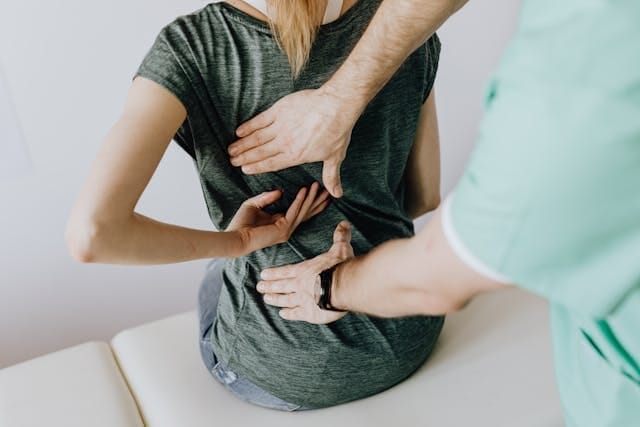
What are the Signs of GERD? How do I Treat GERD Back Pain?
Time to read 4 min
Time to read 4 min
There are several important signs of gastroesophageal reflux disease (GERD) that you shouldn't ignore, namely bloating, gas, reflux, abdominal pain, and back pain. You can get symptom medication to treat pain in the short term, while you focus on long-term solutions to help treat the problem.
With regards to back pain, there could be issues with the muscles of the esophagus putting pressure on the lower back. The high acidity in the body can also put a strain on the joint health and bone health, which could cause back pain in some individuals.
Chronic pain caused by GERD can also lead to issues with inflammation in the body. This can lead to eventual back pain and issues with joint pain overall. The body's high acidic level can also disrupt the functioning of the back muscles which can lead to pain as well.
It is vital to identify the signs of GERD so that you can correlate them with your back pain. You can also focus on treating GERD to help ease the symptoms of back pain, as well as take precautions and medication for back pain directly.
There are several important signs of gastroesophageal reflux disease (GERD) that you shouldn't ignore, namely bloating, gas, reflux, abdominal pain, and back pain. You can get symptom medication to treat pain in the short term, while you focus on long-term solutions to help treat the problem.
With regards to back pain, there could be issues with the muscles of the esophagus putting pressure on the lower back. The high acidity in the body can also put a strain on the joint health and bone health, which could cause back pain in some individuals.
Chronic pain caused by GERD can also lead to issues with inflammation in the body. This can lead to eventual back pain and issues with joint pain overall. The body's high acidic level can also disrupt the functioning of the back muscles which can lead to pain as well.
It is vital to identify the signs of GERD so that you can correlate them with your back pain. You can also focus on treating GERD to help ease the symptoms of back pain, as well as take precautions and medication for back pain directly.
You can identify GERD related back pain by checking for these signs. If you don't have these issues along with your back pain, then there may be another underlying cause. You can have back pain due to a range of reasons, which is why checking for these signs is important.
You can experience gas when you have GERD or other digestive system related issues. You can have this symptom when you are also experiencing acidity, which can create gas in the system.
Bloating is also a common sign of GERD related back pain, which is why it should be tracked over time. You should try to get a gut health test done to check for signs of microbiota related issues.
Joint pain, caused by body pain and high acidity, can be a sign that you may have GERD. If you have joint pain in your knees or other areas, then you may have back pain that is related to GERD.
You can have muscle pain in different areas, which can be a sign that you may have acidity or GERD. There may be muscle pain that emerges when you have gas or bloating, which can require pain relief medication.
GERD and other digestive issues can cause low vitality and issues with energy management. You can experience pain in other areas of the body, unrelated to the back, which can also be indicative of GERD.
You can have hoarseness of the voice, based on the stomach acid irritating the throat. You can have additional symptoms such as coughing, phlegm build-up, and pain.
There may be a burning sensation in the abdominal area, which can be a sign of acid reflux. The key to acid reflux is to focus on improving your fibre and probiotics intake.
It's important to focus on the back pain caused by GERD as a part of a greater group of symptoms. You can focus on imaging tests that can determine the exact reasons behind the GERD symptoms and check for signs of irritation.
You can focus on symptom relief by taking medication, electrolytes, husk, bran, and calcium. These can protect your back muscles and strengthen your bones so that there is limited soreness. You can also choose hot patches, ice application, and other back focused treatments.
A warm bottle applied on the back can help with easing the pain. You can also check for the ways that you are straining your back and add pillows and back rest supports to help ease it further.
Sleep can help you improve your recovery period as well as back pain that may be due to low vitality, muscle pain, and GERD. You can improve your sleep by trying different sleep measuring devices to understand your sleep cycles better.
Daily back stretches can help with relieving gas pains, back pain issues, and weakness in the lower back region. You can perform a range of yoga poses, stretches and rehab activities to help you improve your mobility.
Sometimes stress can create muscle pain that can feel like tiredness or soreness. You should track other symptoms to know whether stress is creating these secondary signs. You can focus on meditation, yoga, walking, trekking, and community focused events, to help reduce stress and improve wellbeing.
You can take medication for acid reflux and over the counter medicine for gas and nausea. These can help ease the pain caused by the GERD acidity and lower the risk of back muscle issues. You can also take electrolytes for muscle pain to balance your essential salts.
Surgical interventions for the lower esophageal sphincter can be performed based on the imaging tests and your symptoms severity. Doctors can recommend surgical interventions based on your medical history and risk prevention measures.
* * Medical Disclaimer - The following information is for educational purposes only. No information provided on this website, including text, graphic, and images, are intended as substitutes for professional medical advice. Please consult with your doctor about specific medical advice pertaining to your condition(s).


